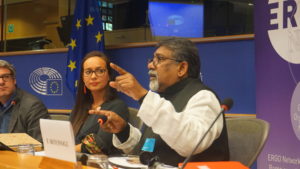Intersecting Realities
Life Stories of Balkan LGBTQIA+ Roma in Brussels
25 February 2020, 9am-2pm, Mundo B, Rue d’Edimbourg 26, Conference Room
Join us and make your voice heard! Register here and find the agenda here.
Balkan LBGTQIA VZW brings together representatives of LGBTQIA+ communities from the Balkan countries, based in Brussels. The role of the organisation is to fight any form of discrimination, addressing particularly the issues of gender identity and sexual orientation, including through providing direct support to migrants, such as legal and administrative. The aim is to break down the barriers often faced by members of the LGBTQIA+ community, and also the boundaries between different Balkan communities themselves. Most volunteers belong to ethnic, religious and other groups, so the organisation also highlights the problems of intersectional discrimination and of belonging to different social groups at the same time: LGBTQIA+, Roma, Muslims, sex workers, refugees etc.
The European Roma Grassroots Organisations (ERGO) Network aims, through the work of its 30 member organisations all over Europe, to convince national and European policy makers that positive change for Roma is possible when antigypsyism is recognized and tackled as the root cause for inequality, and when Roma can take part in civic life as equal stakeholders. Founded on the philosophy of active citizenship, shared responsibility and grassroots empowerment, ERGO Network advocates for better policies and policy implementation on national and European level, rooted in evidence-based research. The organisations creates narratives in which Roma people are equally respected. We aim to show the rich diversity among Roma, challenging stereotypical views.
The two organisations come together in this event to shine a light on the experiences of LGBTQIA persons from the Balkans, most of Roma ethnicity, who are confronted with discrimination based on their gender, sexual orientation, religion and ethnic background in their life.
The event will serve as the launch of the book My Story, which features eight life stories about the experiences of LGBTQIA migrants from the Balkan countries, many of them Roma. It also intends to create a space for debate about intersectionality and multiple discrimination in a Brussels context, with an aim to contribute to policy making based on a rights-based approach and on equal opportunities, by bringing the focus on a target group that has always remained in the shadow of the majority, considering their voice has not been heard so far.




 Paul Divakar, Chairperson of the Asia Dalit Right Forum, brought the global perspective to the panel and pointed out that the SDGs must be designed in a way that they also serve those who are excluded in their societies, across the globe. “If we are not named in the indicators, if there are no data, what do we do? That´s why need to fight for our rights together.”
Paul Divakar, Chairperson of the Asia Dalit Right Forum, brought the global perspective to the panel and pointed out that the SDGs must be designed in a way that they also serve those who are excluded in their societies, across the globe. “If we are not named in the indicators, if there are no data, what do we do? That´s why need to fight for our rights together.”